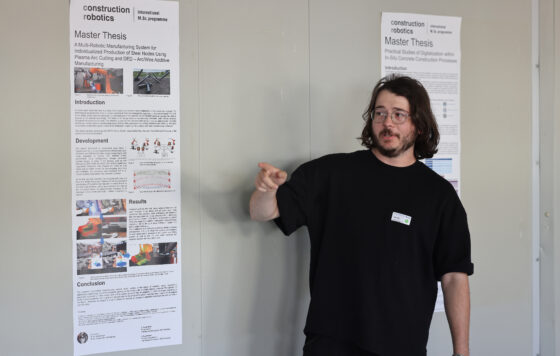
Together with its European research partners, the Center Construction Robotics (CCR) in the Construction Cluster on RWTH Aachen Campus is organising from 26 – 27 August 2025 the Open-Campus-Week on Europe’s first digital Reference Construction Site as part of the 5G Industry Campus Europe.
During these days, the CCR will present research highlights from the collaboration between the interdisciplinary science team at RWTH Aachen University, industry partners and students.
Participation for research partners is free of charge.
Price overview:
-> Contribution fee for external guests who are not sponsors or part of the research activities at the Reference Construction Site – EUR 50
-> Contribution fee for external participants with project presentation – EUR 1,000
On Wednesday, 27. August 2025, the Center Construction Robotics will be offering exciting and varied workshops.
Detailed information on the individual workshops and registration can be found below. Registration deadline: 22 August 2025
Join us and register to expand your knowledge in machine learning, robotics or in the interactive and automated point cloud processing and get in touch with RWTH researchers.
High-resolution images of our event on August, 26 and the Reference Construction Site can be downloaded here. Please note the stated copyright “CCR / Steindl”. This image material may only be used for editorial purposes in the context of reporting on the event on 26.08.2025/the Reference Construction Site and with the specified copyright (CCR / Steindl). In the event of publication, please send us a specimen copy or a Links to the online article.

CCR/Steindl

CCR/Steindl

CCR/Steindl

CCR/Steindl

CCR/Steindl

CCR/Steindl

CCR /Steindl

CCR/Steindl

CCR/Steindl

CCR/Steindl

CCR/Steindl

CCR/Steindl

CCR/Steindl

CCR/Steindl

CCR/Steindl

CCR/Steindl

CCR/Steindl

CCR/Steindl

CCR/Steindl

CCR/Steindl

CCR/Steindl

CCR/Steindl

CCR/Steindl

CCR/Steindl

CCR/Steindl

CCR/Steindl

CCR/Steindl

CCR/Steindl

CCR/Steindl

CCR/Steindl

CCR/Steindl

CCR/Steindl

CCR/Steindl

CCR/Steindl

CCR/Steindl

CCR/Steindl

CCR/Steindl

CCR/Steindl

CCR/Steindl

CCR/Steindl

CCR/Steindl

CCR/Steindl

CCR/Steindl

CCR/Steindl

CCR/Steindl

CCR/Steindl

CCR/Steindl

CCR/Steindl

CCR/Steindl

CCR/Steindl

CCR/Steindl

CCR/Steindl

CCR/Steindl

CCR/Steindl

CCR/Steindl

CCR/Steindl

CCR/Steindl

CCR/Steindl

CCR/Steindl

CCR/Steindl

CCR/Steindl

CCR/Steindl

CCR/Steindl

CCR/Steindl

CCR/Steindl

CCR/Steindl

CCR/Steindl

CCR/Steindl

CCR/Steindl

CCR/Steindl

CCR/Steindl

CCR/Steindl

CCR/Steindl

CCR/Steindl

CCR/Steindl

CCR/Steindl

CCR/Steindl

CCR/Steindl

CCR/Steindl

CCR/Steindl

RWTH Aachen Construction Robotics Open Campus Day 2025

CCR/Steindl

CCR/Steindl

CCR/Steindl

CCR/Steindl

CCR/Steindl

CCR/Steindl

CCR/Steindl

CCR/Steindl

CCR/Steindl

CCR/Steindl

CCR/Steindl

CCR/Steindl

CCR/Steindl

CCR/Steindl

CCR/Steindl

CCR/Steindl

CCR/Steindl

CCR/Steindl

CCR/Steindl

CCR/Steindl

CCR/Steindl

CCR/Steindl

CCR/Steindl

CCR/Steindl

CCR/Steindl

CCR/Steindl

CCR/Steindl

CCR/Steindl

CCR/Steindl

CCR/Steindl

CCR/Steindl

CCR/Steindl

CCR/Steindl

CCR/Steindl

CCR/Steindl

CCR/Steindl

CCR/Steindl

CCR/Steindl

CCR/Steindl

CCR/Steindl

CCR/Steindl

CCR/Steindl

CCR/Steindl

CCR/Steindl

CCR/Steindl

CCR/Steindl

CCR/Steindl

CCR/Steindl

CCR

CCR

CCR

CCR

CCR

CCR

CCR

CCR

CCR

CCR

CCR

CCR

CCR

CCR

CCR

CCR

CCR

CCR

CCR

CCR

CCR

CCR

CCR

CCR

CCR

CCR

CCR

CCR

CCR

CCR

CCR

CCR

CCR

CCR

CCR